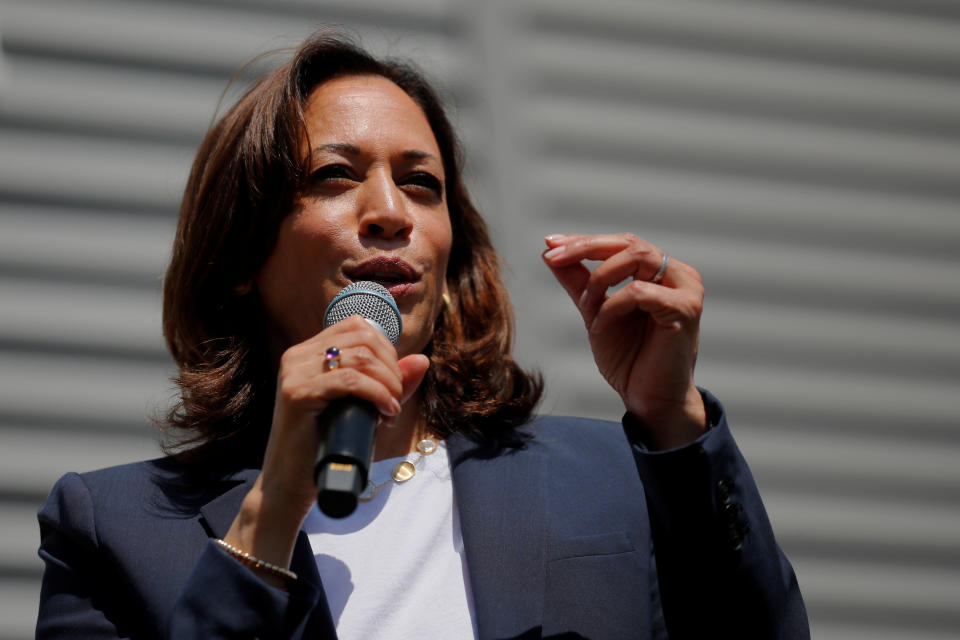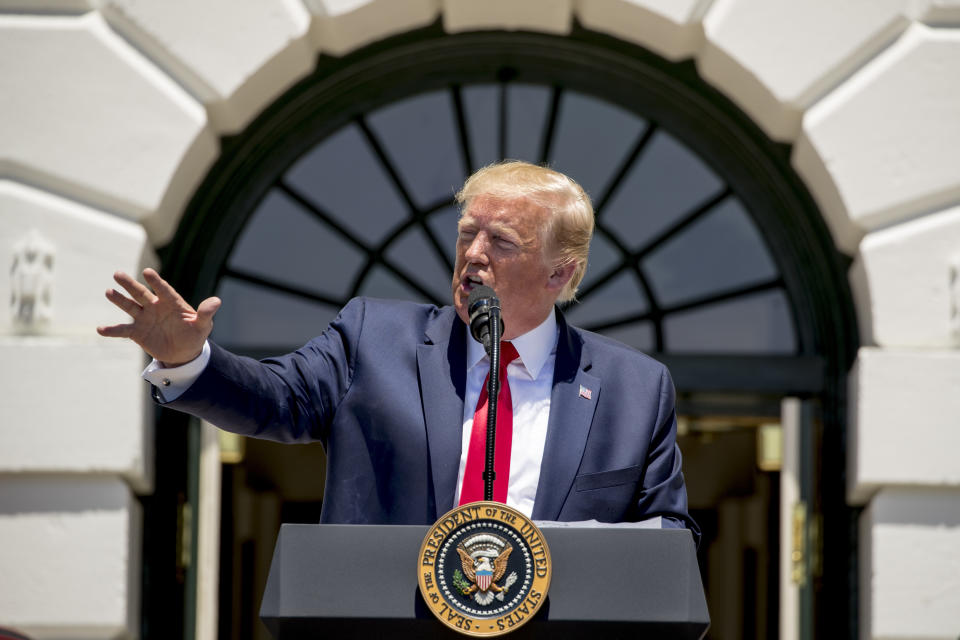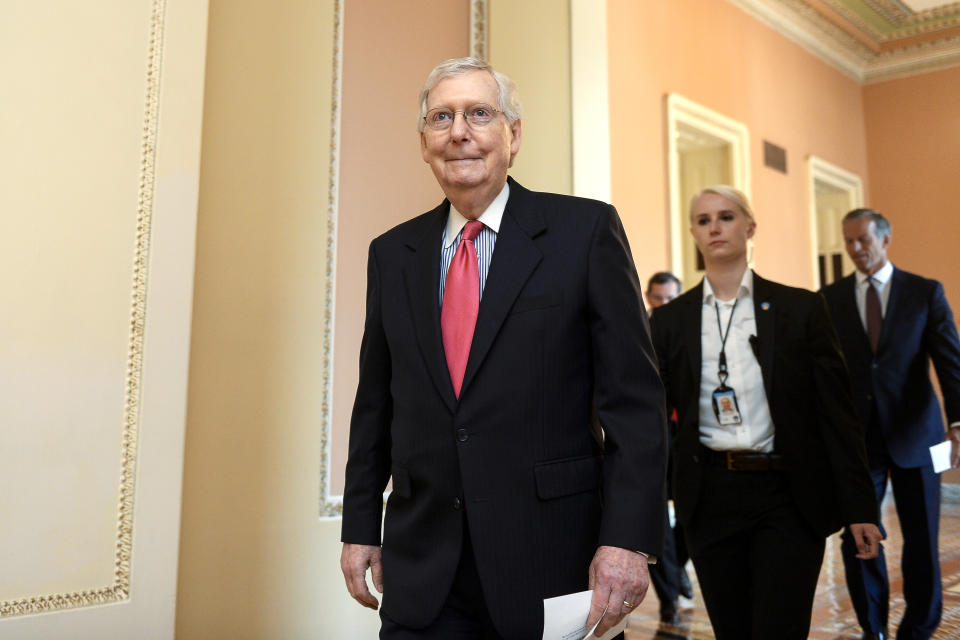Trump may think being called a racist will help him win in 2020
Donald Trump appears to be betting his presidency on a counterintuitive premise: that even in 21st century America, race baiting can still win elections.
When Trump doubled down Monday on his line that a group of minority women in the House should leave the country if they don’t like it, he said more than once that he believes his language — which was widely condemned as racist by Democratic politicians and members of the press — will rally voters to his side.
“A lot of people love it, by the way,” Trump said of his earlier tweet. “A lot of people love it.”
Trump added that his message was simply that America is great, that the economy is doing well, and that if people don’t like it here, they can leave.
“Those Tweets were NOT Racist,” Trump tweeted Tuesday. “I don’t have a Racist bone in my body!”
Time and again, Trump has waded into racially charged controversies — over the white supremacist protests in Charlottesville, Va., or the NFL national anthem protests, or the influx of asylum seekers on America’s southern border — with inflammatory language that triggers accusations of racism.
But it’s starting to seem as if provoking such accusations may be the whole point. Selling America on an agenda of banning Muslims and separating immigrants from their children is hard, but convincing some smaller subset of the Republican electorate that Democrats see Trump supporters as racists? That’s much easier, especially when Trump himself is constantly goading those same Democrats into calling him a racist.

“They have a very clear strategy, Trump and his campaign,” said former Obama strategist David Axelrod on Monday’s “Hacks on Tap” podcast. “Everybody needs to keep an eye on this guy’s tactics and not get lit on fire every time he does something outrageous and morally bankrupt.”
The idea is not so much that Trump’s offensive racial remarks will inspire a critical mass of Americans to vote for him. Rather, it’s that Trump supporters will be outraged by the label “racist,” then motivated to turn out in 2020 — and vote against Democrats — because of it.
“The Democrats have to be careful about giving Trump the war he wants,” said Republican strategist Mike Murphy, Axelrod’s “Hacks on Tap” co-host. “They can have all the moral high ground, and they have it on this. But if it comes down to a big racial-identity war in America, that is fuel for Trump’s type of demagoguery.”
As if on cue, a new Reuters/Ipsos poll conducted Monday and Tuesday showed Trump’s net approval among Republicans rising in the wake of the controversy.
Democratic responses to Trump over the past few days show his opponents understand this potential trap, even if they aren’t completely sure how to avoid it.
Sen. Kamala Harris, D-Calif., who was asked about Trump’s comments Sunday evening after a day of campaigning in New Hampshire, unequivocally called Trump’s comment “racist and un-American” but then pivoted to a more uplifting message about the need for the country to have a unifying leader.

“This guy doesn’t understand his responsibilities, and I don’t think he understands what the American people want from their president, which is somebody who is going to elevate public discourse and speak with a level of dignity with the goal of unity,” Harris said. “This president doesn’t understand that and that’s why I’m running against him, and that’s why he needs to go.”
But in the headline-driven news cycle, the main takeaway for most people was her denunciation, and her attempt at being a unifier got lost in the wash.
Similarly, the four House Democrats targeted by Trump said, to different degrees, that Trump’s attack on them was a diversion.
“We’ll stay focused on our agenda,” said Rep. Alexandria Ocasio-Cortez. “All of this is a distraction. ... He does not know how to defend his policies, so what he does is attack us personally.”
“This is a distraction and we should not take the bait,” said Rep. Ayanna Pressley.

Yet no one has talked of much else since Sunday morning. And the news cycle on Tuesday was consumed with news of blowback to House Speaker Nancy Pelosi’s comment on the House floor that Trump’s comments were “racist,” which triggered a protest from Republicans over the fact that House rules forbid referring to the president with such descriptions. The Democratic-controlled House voted to allow Pelosi’s comments to stand, prompting more outcries from Republicans.
Politico, citing anonymous sources in and around the White House, reported that Trump’s advisers viewed his original Sunday morning tweets as going too far, and that the president knew he had erred and tried to recast the comment in his back and forth with reporters at the White House Monday afternoon without backing down.
Regardless, the righteous anger of Trump’s critics may not hurt him among key voters in swing states such as Michigan, Pennsylvania and Wisconsin, where a disproportionate number of white working-class Trump supporters stayed home in 2018 — and may ultimately return to the ballot box if they can be persuaded that Democrats are accusing them, by proxy, of racism.
There are signs that Trump understands these dynamics. “One of them is polling at 8 percent,” the president told reporters Monday — an apparent reference to an internal Democratic poll that leaked to Axios Sunday and showed Rep. Omar with a 9 percent approval rating among white, non-college, swing-district voters.

Meanwhile, Ari Fleischer, who was a White House press secretary for President George W. Bush and who has spoken with Trump campaign advisers about their turnout projections, told the Washington Post that “Trump is proposing a giant swap.”
“Republicans can no longer count on suburban women and we will continue to lose college-educated men and women, while we increasingly pick up working white Americans without college degrees,” Fleischer explained. “Nobody knows who will come out ahead in the swap.”
And in the middle of the firestorm Trump retweeted a video from a young conservative named Brandon Straka that vilified the media for invoking “racism, homophobia, bigotry and falsely assign[ing] these emotionally charged accusations to people in situations where they do not belong.”
It’s “simply to control your thinking” and it is “criminal,” said Straka, a self-described former liberal who has launched a campaign to convince Democrats to “walk away” from the party. “It turns out they do it all the time.”
Senate Majority Leader Mitch McConnell echoed this line Tuesday, telling reporters that the “political rhetoric has really gotten way, way overheated all across the political spectrum,” before directing his ire at Democrats.
“We’ve seen the far left throw accusations of racism at everyone, anyone who disagrees with them on anything — including the speaker of the House,” McConnell said, referencing the recent dispute between Nancy Pelosi and “the Squad.”

Even Tim Scott, the GOP’s only African-American U.S. senator, stopped short of calling Trump’s tweet racist. Instead, Scott said it was “racially offensive.”
One veteran Democratic strategist noted that “Trump tried this in 2018” during the midterms by describing the so-called caravan as an invasion of undocumented immigrants. “He leaned in late on the immigration stuff and the dog whistles,” the Democratic strategist said. “The candidates that managed to navigate that by not taking the bait did pretty well.”
But he also said the current flap is just a dress rehearsal for the more consequential challenges that will confront the eventual Democratic nominee.
“It’s going to matter a lot more when we get to April next year and we see how the candidate who’s running against Trump handles it,” he said.
Even so, the various Democratic hopefuls might as well start honing their counterstrategies.
“We’re going to see a steady diet of this from now until November of 2020,” Axelrod predicted. “So this is not for the squeamish. Everybody fasten their seatbelts. It’s going to be a very bumpy ride.”
_____
Read more from Yahoo News:

